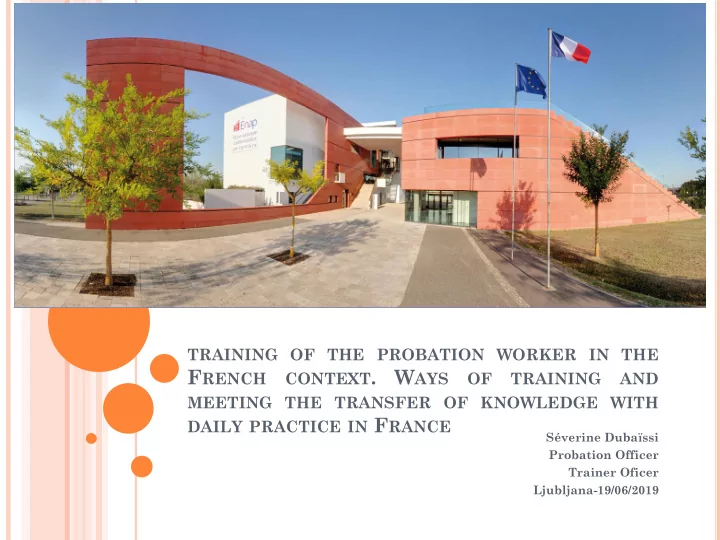

TRAINING OF THE PROBATION WORKER IN THE F RENCH CONTEXT . W AYS OF TRAINING AND MEETING THE TRANSFER OF KNOWLEDGE WITH DAILY PRACTICE IN F RANCE Séverine Dubaïssi Probation Officer Trainer Oficer Ljubljana-19/06/2019
I . L ’O RGANISATION DE L ’A DMINISTRATION P ÉNITENTIAIRE FRANÇAISE Ministry of Justice Penitentiary Administration directorate National 9 inter-regional directorates Penitentiary + overseas mission Administration School 103 Probation and Rehabilitation services 187 prisons
T HE ENAP ORGANISATION
R ECRUITMENT AND TRAINING OF THE PROBATION OFFICER IN FRANCE A competitive exam All kinds of background : law, history, psychology, … Level required : 3 years after the bacaulerate Duration of training : 2 years sandwich course Places : at the ENAP and in probation services all around France Trainers : penitentiary staff who passes a competitive exam and undergoes a training + experts when specific knowledge required
T HE STRUCTURAL ORGANISATION OF THE TRAINING 2 years Sandwich training : cycles at school and internships on the field
T HE ORGANISATION OF THE PO ’ S TRAINING
TO ENSURE THE TRANSFER OF KNOWLEDGE INTO THE PRACTICE The content of the courses and the pedagogical methods The content of the internship and the way it goes on The link between the school and the field
CHALLENGES A big diversity in the profiles of our trainees No link made between the theoretical courses and the practice on the field Some courses are said « useless » or too far from the reality of the field How to involve the trainees in their training Some mentors on the field : « forget what you’ve learnt at school » No control on the field even if…
T HE CONTENT OF THE TRAINING Preparation of the internships The come back from the internships Analysis of the professional practices Conducting an interview Writing reports Interviews with the mentors at the ENAP
T HE PEDAGOGICAL METHODS The role plays The case studies On the job training Some courses delivered by PO from the field The work asked to the trainees The simulation building
T HE ASSESSMENT OF THE TRAINEES At the ENAP On the field
W AYS OF TRAINING AND MEETING THE TRANSFER OF KNOWLEDGE WITH DAILY PRACTICE 1 mentor (PO) for a group at the ENAP 1 mentor (or more) for each trainee in probation services during the internships
T HE CONTEXT OF THE FIELD THE INTERNSHIPS A strong impact on the trainees The choice of the mentors The posture of the mentors
S OME CONCRETE SOLUTIONS The PO’s unit at the ENAP The mentors on the field The mentors at the ENAP The trainer officer at the interregioanl directorate An electronic notebook
S OME CONCRETE SOLUTIONS The training of the mentors Meeting at the ID between the ENAP and the trainer officers and the mentors Meetings at the internship places The « welcome booklet » of the trainee The RPO : national guidelines
T O CONCLUDE Still a big issue Improve the quality of the link between the ENAP and the field
Thank you for your attention !
Recommend
More recommend